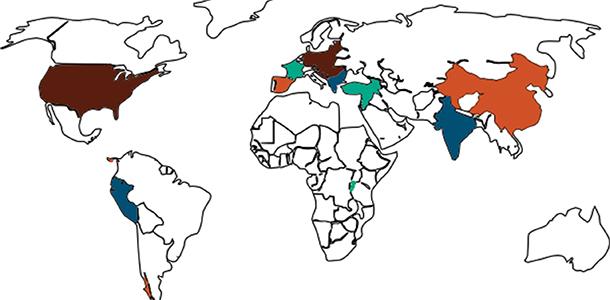From Chile to Rwanda: Guilford goes global
The colored portions of this map designated countries students will travel to over January term.
A month of Netflix binge-watching and sleep or a month of life-changing experiences. Anything is possible during the Guilford College January term.
J-Term, headed by Professor of Chemistry Rob Whitnell and Interim Director of Study Abroad Daniel Diaz, gives students the opportunity to explore their interests both on and off campus.
Still in its trial period, J-Term squeezes in three weeks of intensive study between winter break and the start of spring semester. Students are offered a variety of different classes, usually selected by faculty to give students the chance to study something outside of their major.
During J-Term, there is an entirely different kind of energy in the classroom. On campus courses typically meet once a day, often for over three hours. The extended hours and unique topics make for interesting discussion.
“I taught a January course last year,” said Mark Justad, director of the center for principled problem solving and adjunct professor of religious studies. “And what I found was that it gives you a chance to engage a topic at a deeper level more quickly. You lose something in terms of not having a whole semester, but I think it allowed us to get to know each other very quickly. It forced us. And we didn’t have to leave too many questions aside. We really had to engage.”
With a yearly average of over 300 Guilford student attendees and over 25 different on and off campus programs offered, J-Term has no shortage of engaging opportunities on and off campus. However, the study abroad programs take the lead.
“We offer a variety of programs during the January semester,” said Diaz. “Those programs can be off-campus, but most of our programming is international. We have one group going to Costa Rica. We have another group of students going to Rwanda. Different programs, all over the world.”
Outside of Rwanda and Costa Rica, Guilford students will be visiting areas such as Shanghai, China; Chikhale, India; Oxford, England and Paris, France. Some will spend their J-Term studying chimps, while others look at the art of furniture making.
A trip headed by Krista Craven, assistant professor of justice and policy Studies, and Holly Peterson, assistant professor of geology, will examine post-war Rwanda through a series of different lenses.
“The course looks at how the country has been trying to address social and environmental issues, specifically after the genocide,” said Craven. “And that’s in a period of just less than three weeks. It’s really exciting. We actually had students inquire from other universities to participate.”
The group of 14 will spend their month in Rwanda, studying the social and environmental response the Rwandan genocide and building connections with the community and Rwandan Quakers.
“Every day we’ll be doing labs which involve tracking chimpanzees and sampling soil and learning about peace building efforts in the aftermath of the genocide,” said Craven. “It’s going to be a unique opportunity that we wouldn’t be able to do in the same way if we were gone for the whole semester.”
For those who prefer not to travel abroad, there are also a couple of domestic options. Groups will be visiting the Northwoods, Ely and the North Shore of Lake Superior, Minnesota to study wildlife. Another trip is scheduled to Ghost Ranch, a retreat center in Santa Fe, New Mexico. Students can pick from any number of focuses for the mini-semester, including holistic medicine and photography.
Unfortunately, J-Term is on a limited schedule. The program, initially adopted for a trial run that will expire in 2017, has the Guilford College administration wondering what’s next.
“We are in the process of discussing the future of the January term,” said Diaz. “There are a variety of ways students can voice their interest and help the college make the decision on whether we want to keep it. I encourage people to look for surveys, through the Buzz or the website, and show their support, or let us know what’s going on.”










